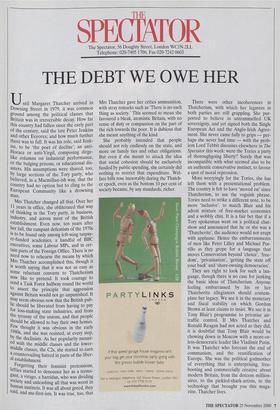The Spectator, 56 Doughty Street, London WC1N 2LL Telephone: 020-7405
1706; Fax 020-7242 0603
THE DEBT WE OWE HER
Until Margaret Thatcher arrived in Downing Street in 1979, it was common ground among the political classes that Britain was in irreversible decay. How far this country had fallen since the early part of the century, said the late Peter Jenkins and other Eeyores; and how much further there was to fall. It was his role, said Jenk- ins, to be `the poet of decline', an anti- Horace or anti-Virgil, composing dirge- like columns on industrial performance, or the bulging prisons, or educational dis- asters. His assumptions were shared, too, by large sections of the Tory party, who believed, in a Macmillan-ish way, that the country had no option but to cling to the European Community like a drowning man, Mrs Thatcher changed all that. Over her 11 years in office, she obliterated that way of thinking in the Tory party, in business, industry, and across most of the British establishment. Even now, ten years after her fall, the rampant defeatism of the 1970s is to be found only among left-wing taxpay- er-funded academics, a handful of BBC executives, some Labour MPs, and in cer- tain parts of the Foreign Office. There is no need now to rehearse the means by which Mrs Thatcher accomplished this, though it Is worth saying that it was not as easy as some reluctant converts to Thatcherism now like to pretend. It took courage to send a Task Force halfway round the world to assert the principle that aggression against Britain would not go unpunished. It may seem obvious now that the British pub- lic should be liberated from having to pay for loss-making state industries, and from the tyranny of the unions, and that people should be allowed to buy their own homes. flew thought it was obvious in the early 1980s, and she was resisted, at every step, by the declinists. As her popularity mount- ed with the middle classes and the lower- Middle classes, the C2s, she started to earn a countervailing hatred in parts of the liber- al establishment.
. Forgetting their feminist pretensions, lefties started to denounce her as a terma- gant, a virago, a harridan, who was dividing society and unleashing all that was worst in human instincts. It was all about greed, they said, and me-first-ism. It was true, too, that Mrs Thatcher gave her critics ammunition, with stray remarks such as 'There is no such thing as society.' This seemed to mean she favoured a bleak, atomistic Britain, with no sense of duty or compassion on the part of the rich towards the poor. It is dubious that she meant anything of the kind.
She probably intended that people should not rely endlessly on the state, and more on family ties and other obligations. But even if she meant to attack the idea that social cohesion should be exclusively funded by public spending, she certainly did nothing to restrict that expenditure. Wel- fare bills rose inexorably during the Thatch- er epoch, even as the bottom 10 per cent of society became, by any standards, richer. There were other incoherences in Thatcherism, with which her legatees in both parties are still grappling. She pur- ported to believe in untrammelled UK sovereignty, and yet signed both the Single European Act and the Anglo-Irish Agree- ment. She never came fully to grips — per- haps she never had time — with the prob- lem Lord Tebbit discusses elsewhere in The Spectator this week: were the Tories a party of thoroughgoing liberty? Surely that was incompatible with what seemed also to be an authentic conservative instinct, to favour a spot of moral repression.
More worryingly for the Tories, she has left them with a presentational problem. The country is felt to have 'moved on' since Thatcherism, to use the voguish phrase. Tories need to strike a different note, to be more 'inclusive', to match Blair and his adroit mixture of free-market economics and a wobbly chin. It is a fair bet that if a Tory spokesman went on a political chat- show and announced that he or she was a `Thatcherite', the audience would not erupt with applause. Hence the embarrassments of men like Peter Lilley and Michael Por- tillo as they grope for a language that moves Conservatism beyond 'choice', 'free- dom', 'privatisation', 'getting the state off your back' and 'share-owning democracies'.
They are right to look for such a lan- guage, though there is no case for junking the basic ideas of Thatcherism. Anyone feeling embarrassed by his or her Thatcherite allegiances should contem- plate her legacy. We see it in the monetary and fiscal stability on which Gordon Brown at least claims to insist. We see it in Tony Blair's programme to privatise air- traffic control. If Mrs Thatcher and Ronald Reagan had not acted as they did, it is doubtful that Tony Blair would be chowing down in Moscow with a more-or- less-democratic leader like Vladimir Putin. It was Thatcher who forecast the end of communism, and the reunification of Europe. She was the political godmother of everything that is enterprising, free- booting and commercially creative about modern Britain, from the dotcom million- aires, to the pickled-shark-artists, to the technology that brought you this maga- zine. Thatcher lives.





























































































 Previous page
Previous page